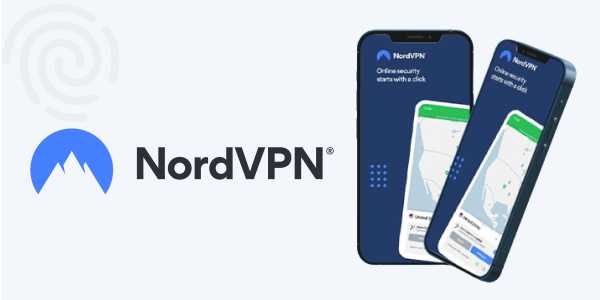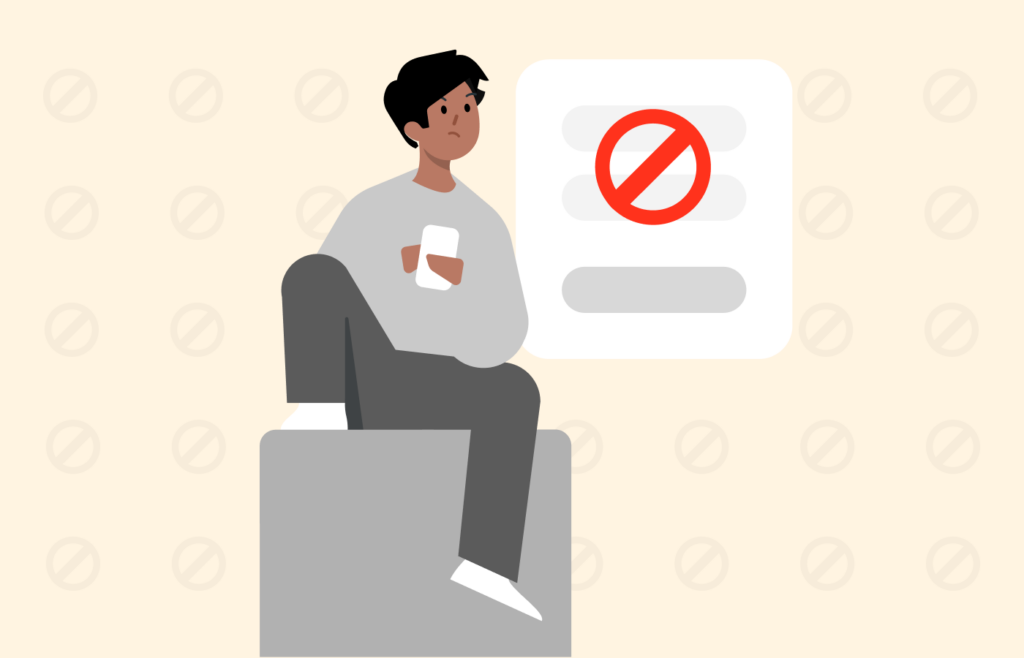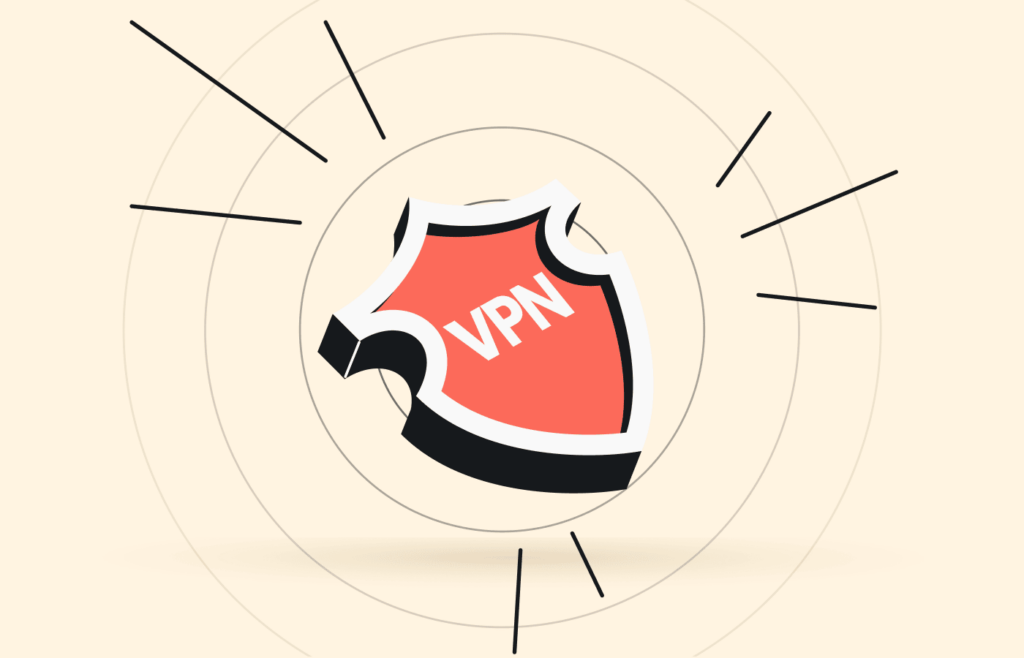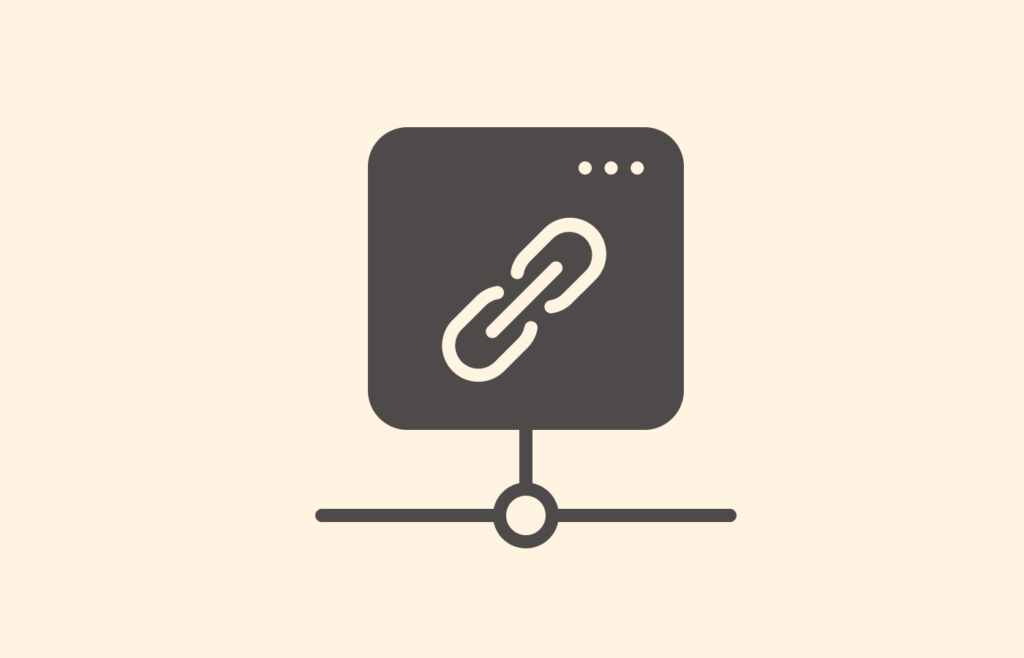Location-based restriction on content (aka geo-restrictions) is a common phenomenon that authorities implement for various reasons in most countries. Sometimes, governments restrict a specific content niche as it clashes with their values or interests.
In other instances, such restrictions arise from the websites’ end for different reasons. For example, a streaming service may restrict the availability of a particular movie or TV show outside a specific region due to licensing issues. Whatever the case, the ultimate victim of such policies is you—the end user.
Thankfully, some workarounds (such as VPNs) still exist that help users bypass content restrictions and IP blocking. This article covers all of that, but let’s start with the basics.
A quick guide to bypass geo restrictions and IP blockers

In a hurry? Here is how you can bypass geo-restrictions quickly:
- Sign up for a quality VPN. Our cybersecurity researchers and privacy writers all regard NordVPN as the best VPN to beat geo-blocking and recommend it (including me).
- Download and install the NordVPN app; you will get a dedicated app for all the major devices with them.
- Connect to a VPN server in a suitable country. For instance, you should connect to a US server if you want to unblock US Netflix or watch Hulu outside the US. Similarly, for unblocking BBC iPlayer outside the UK, you would need to connect to a British server.
- Finally, go to the website you wanted to unblock or log into the service of your choice and enjoy the content you wanted to. That is it.
What is geo-restriction?
The video you wanted to watch on YouTube has been blocked in your region, and you wonder why and especially how?
That is because companies use a technique called “geo-restriction” to prevent users of a certain region from accessing content from another. Geo-restriction is a practice that firms use to show you content based on your location.
You can take the example of the BBC to understand geo-restriction better.
The British Broadcasting Corporation is a public service managed by the British government. British taxpayers fund it and it is accessible to all residents of the United Kingdom.
Originally, BBC content was only broadcast on radio and television, but, adapting to the changing media landscape, it began to make content available online through a service called BBC iPlayer.
This service broadcasts all shows, sporting events, on-demand movies, and more, but only for those who happen to be in the United Kingdom.
When you try to access this service outside the UK, you receive a note saying you cannot see this content in your region.
The same goes for sites like Netflix and Hulu.
Not only third-party shows and movies but also those made by Netflix (like House of Cards) are only visible in certain parts of the globe. In fact, Netflix has a different version for each country.
That means if one title is available in the US catalog, it might not be available in the UK, India, Pakistan, or other Netflix versions.
Admittedly, it can be quite annoying if you are on vacation and want to watch the program of your choice.
The situation can even become controversial when you realize that European Union residents pay more for Netflix while having less variety of content.
So on top of being unable to access certain content, geo-blocking can even force one to pay more for a service.
Now that you know what geo-restriction is, it is time to shed some light on how it works so that when I present you with the methods to circumvent geo-blocking, you can get started with them quickly.
How do regional restrictions work?
On the internet, each computer has a unique digital identifier in a format that is similar to xxx.xxx.xxx.xxx.xxx.xxx.
It is called an Internet Protocol address, or IP address for short.
Whenever you visit a site, that number is sent with the request, and the very same number (IP address) enables sites and apps to determine your physical location.

How? We hear you ask.
IP addresses are assigned to ISPs (Internet Service Providers), who pass them on to customers.
Ultimately, websites detect your IP and determine the physical location by detecting your ISP.
Once a website knows your location, a filter gets applied to show you the content according to your region.
Geo-blocking legality and examples
There are no clear laws on geo-blocking, but the EU is taking some steps to protect its citizens from the abuse.
In 2018, the Council of the EU adopted a resolution to prohibit unjustified geo-blocking between its member states because political and economic unions consider any restriction based on a person’s place of residence discriminatory.
Another initiative, the Single Digital Market Strategy, was adopted to end geographic restrictions on electronic commerce.
That strategy allows individuals and businesses to conduct online activities and benefit from the best possible data protection, regardless of their geographic location.
Thanks to these measures, the content restrictions between EU member states are considerably reduced. Admittedly, the EU is showing a way to promote fair practices in the digital world.
In the U.S., companies like Netflix argue that geo-blocking is essential to protect the copyrights of artists and producers of TV shows and movies.
PayPal, which also practices geo-blocking, notes:
We do not allow the use of our service for transactions that infringe the copyright or other proprietary rights.
Understandably, the laws concerning geo-restrictions can vary from country to country.
If you look at existing legislation of the US, the Copyright Act of the country and its amendments protect copyright holders and determine the “fair dealing” of their copyrighted material.
However, this law does not mention geo-blocking, meaning you cannot be prosecuted for circumventing these geographic blockages.
One of the main reasons for this legal ambiguity is that services like Netflix stream their content instead of allowing downloads.
It is, therefore, unclear whether watching content online, as opposed to owning said content, violates existing copyright laws.
The overall take is; if you want to bypass geo-blocking, you are legally secure.
In states such as Australia and North America, geographical blocking is a usual method to secure the copyright of movie/TV producers, artists, and content developers.
While in regions like the Middle East, Asia, Africa, and South America, no proper regulations specify whether the geographical blockade is illegal or legal.
Consequently, it all comes down to the state laws where you currently live, but one thing is for sure, you cannot be prosecuted for bypassing geo-restrictions online.
Why sites deploy geo-restriction
By now, you must know why websites and applications worldwide apply geo-restrictions. Knowing the reasons behind such policies is essential to understand better the need to bypass geo restrictions on your desired content.
So, here is an overview of the primary reasons why you encounter geographical restrictions online:
Legal requirements
Sometimes, certain companies must follow specific international and national laws to operate in a country or region, and those laws can force firms to use geographic restriction methods.
For example, online casinos usually need to use geographic restrictions to fulfill online gambling regulations, especially because they are not legally authorized to offer their services in countries that prohibit internet gambling.
Blackouts
In the United States, blackouts frequently use geographic blockages, a method “popular” with national networks, broadcast companies, associations, and sports leagues.
Mostly, geographical limitations are used to ensure that a certain event is not transmitted in an area where:
- The occasion is happening.
- The rights of distribution are the exclusive property of national networks.
- The occasion is already being broadcast locally.
Price discrimination
Geo-restrictions can be helpful to impose price discrimination: the act of displaying different prices according to the country from which the user connects online.
Online retailers and airlines tend to do this to better separate the globe into multiple market segments and make higher profits.
Fundamentals of state law
An administration can use the geo-restriction method for legal requirements.
For example, the United Kingdom government uses geographic blocks to ensure that its TV content is only accessible in the United Kingdom since taxpayers’ money funds everything.
Rights of license
Copyright holders and content providers must purchase license rights in a specific country to transmit their content.
That can be quite expensive (especially when you think of multiple countries-specific taxes that might come into play), so it is not hard to imagine buying license fees worldwide is out of the question.
Copyright agreements
Content providers (such as Netflix, BBC iPlayer, Hulu, etc.) do not own the rights to all the content they have on display; mostly, they only have the right to transmit it.
Therefore, the original copyright holder decides if they want the content to be transmitted worldwide.
If that is not allowed, content platforms must respect those regulations, and geographic restriction technology helps them to do so.
Bypassing geo-blocking and location errors (four easy ways)
Finally, after covering all the basics, we are at our main interest; the way to access geo-blocked content.
Since geographical limitations are deployed on your IP address, the finest way to avoid geo-restrictions is to discover a way to change or hide it.
Although it may sound complicated, there are multiple easy ways to mask your geographic location or IP address, no matter where you are or go.
Here I will show you quick and easy ways to bypass geo-restrictions and location errors so you can enjoy the internet as it is meant to be. Let us get started.
1. Virtual Private Network (VPN)
A VPN is the most widely-used (and comfortable) way to beat geo-blocking.
A Virtual Private Network hides your actual IP address by switching it with the IP address of the Virtual Private Network server of your choice.
Any site you visit while connected to the Virtual Private Network will see the IP address of the VPN server.
That tricks the website into seeing you coming from your very own selected fake location; hence, you get to enjoy the content blocked for your actual physical location.

For example, if you live in Thailand and connect to a UK-based VPN server, any site you access will see you coming from the United Kingdom. It will allow you to access all the content that was available to users in the UK only.
Notably, since a Virtual Private Network utilizes encryption to provide additional security, your connection speed can drop slightly.
However, the decrease in your internet speed after connecting to a VPN would be so slight that you could not even notice, but I think it was still worth mentioning.
Many VPNs are available on the market today, but we found ExpressVPN to be the best for bypassing geo-blocks without compromising speed.
With more than 30K servers worldwide (in over 90 countries, to be specific), ExpressVPN can let you easily access geo-restricted content from any part of the world.
The service boasts dedicated apps for almost all major operating systems, including Windows, Android, Mac, iOS, and more.
ExpressVPN even offers free extensions for the leading browsers alongside detailed instructions for smart TVs, consoles, and routers.
Read our in-depth ExpressVPN review.
2. The Onion Router (TOR)
Another way with which you can hide your whereabouts on the internet is Tor.
It is a free service that hides your IP address whenever you send or request data online.
Your online traffic passes between multiple relays (nodes executed by volunteers), which ensures that your digital fingerprints are always hidden.

While Tor can be useful for dealing with geographical restrictions, it is worth noting that it is not a reliable option compared to the above-covered VPN.
ISPs can block relays if they are discovered, which in return, will make you suffer from slow connection speeds.
Also, sometimes governments can block TOR completely (for the maximum possible time they can).
While TOR provides many privacy and security features and properties, not everyone has the luxury of using it worldwide.
Many authorities and repressive governments keep identifying and blocking Tor relays to keep users at bay from having open access to the internet.
So, again, you can try this method, but it might not be as reliable as the first one, VPN.
Lastly, if you find that Tor is blocked for you and you still want to use this method, there is a way around it that you can try to break through the censorship.
3. Proxy
It is a service that mediates between the web and a small network.
Proxy is often used to prevent geo-restrictions because it can quickly mask a user’s IP address.

Also, it can cache pages (which means saving sites that were already visited to use afterward), allowing you to access sites swiftly.
Yet, most of the time, proxies propose no security or very little.
And if that does not bother you, another thing worth noting is that the internet speed you can enjoy with the proxies is quite devastating.
Why? I hear you ask. The common reason for it is that free proxy servers often have bandwidth limits.
Also, suppose you wish to use a proxy with HTTP connections (portals without an SSL certificate installed). In that case, you must remember that the owner of that proxy can always see your IP address or even record your internet activities.
So however, millions of people worldwide use free web proxies to improve online security, bypass censorship, and access sites that are blocked in their country.
But remember, free services usually come at a cost (an unexpected one) for users: their security and privacy.
To combat online safety vulnerabilities, many users expose themselves using free proxies and opt for a safe alternative, like a quality paid VPN service.
4. Smart DNS

A Smart DNS does not hide or change your IP address but masks the DNS address assigned by your ISP, which contains data that can disclose your geographic location to sites.
The Smart DNS mainly replaces your real DNS with a fake one pointing to a “permitted” geographic location.
Besides, this service also intercepts your connection requests and eliminates any data that may be associated with your geographic location.
Subsequently, such services replace that information with new data linked with a geographic location where the content you wish to access is available.
Unlike a Virtual Private Network, a Smart DNS uses no encryption.
It takes the data related to a user’s geographical location and redirects them via another server without decreasing the Internet speed.
However, the drawback is that you can be exposed online as your information and online connections are not protected.
You can try a good number of SmartDNS services on the market. Some of the top SmartDNS providers include Overplay, Unblock-US, Getflix, UnoTelly, SmartyDNS, and UnoTelly.
All these providers keep raising their games continuously, so they are worth a try that you should decide to go with the SmartDNS method to beat geo-restrictions.
Overcoming specific geographical area restrictions
Netflix geo-restrictions
The most popular streaming sites in the world have extensive geoblocking capabilities.
From a consumer perspective, Netflix offers users a much more limited content library outside the United States because of its existing license agreements.
For example, if you subscribe to Shanghai, you cannot enjoy the House of Cards, even if it’s an original Netflix series.

This gives many Netflix and House of Cards fans a good reason to hide their location to access the content they love.
For years, Netflix subscribers have been using VPNs and web proxies to hide their IP addresses, allowing them to access the content they like.
However, not all the VPNs out there work as effectively for unblocking Netflix as in the past Netflix decided to counterattack by blocking VPNs.
It is like a game of cat and mouse set up as VPN providers keep redoubling their efforts to provide servers capable of unblocking Netflix.
So, you need only pick a Netflix-compatible VPN that works with the streaming service giant effectively.
According to our extensive testing of VPNs, we found the following providers to be the best Netflix VPNs:
- NordVPN
- ExpressVPN
- CyberGhost
- Surfshark
- PrivateVPN
BBC iPlayer
As mentioned earlier, the BBC iPlayer allows you to stream UK content. But, it is not available for those outside the UK.
You cannot access its content even if you are a UK resident traveling abroad or an expatriate living in another country.

VPNs allow you to work around this, so you can keep watching your favorite content no matter where you are.
According to a BBC report, over 60 million people outside the UK watch BBC iPlayer for free, using VPNs or proxy servers.
It is estimated that in China alone, around 40 million people access the BBC iPlayer app.
The rest are from countries like the United States, Australia, Ireland, India, Brazil, Germany, and France.
Youtube
YouTube allows content creators to geo-block videos from their channels.

In the past, one could easily change the YouTube URL to bypass geographic locations, but it no longer works.
Now, you can use browser plug-ins like ProxMate, web proxies, or ideally reliable VPNs (my personal go-to VPN is ExpressVPN for unblocking YouTube, too).
There also are sites like UnblockYouTube that unblock YouTube videos for you.
What is the best method for bypassing geo-restrictions?
The short answer is it all depends on you and your budget.
Using a Smart DNS or VPN is better to avoid geo-restrictions.
If you wish for excellent speeds, go for a Smart DNS. And if privacy is your priority alongside speed, you should go with a VPN.
Proxies are not very dependable concerning your safety and speeds, and ISPs can often block Tor if a relay gets revealed.
Also, while using Tor, you cannot expect reliable speeds as the number of relays in operation (about 7,000) cannot handle the huge amount of users that turn to Tor daily.
FAQs
While bypassing regional restrictions in China is difficult, it isn’t impossible. A reliable VPN can evade the firewall, although the government is tirelessly trying to block privacy-focused services, including VPNs. Hence, only a handful of VPNs can reliably unblock Chinese content. Remember that you have to install the VPN app before arriving in China. Also, opt for a VPN with an obfuscation feature to conceal your VPN traffic.
Some services have stricter geo-blocks than others. For instance, a local streaming site will likely not have advanced geo-restriction features, and you can easily access it with any VPN or proxy. However, an international service like Netflix invests significantly in blocking technologies, and only a few VPNs can bypass its restrictions.
Geo-blocking is restricting content or websites in a specific geographical location. On the other hand, geofencing creates a virtual geographic boundary around a particular location. You can only access certain content or websites once you cross the blocked area.


